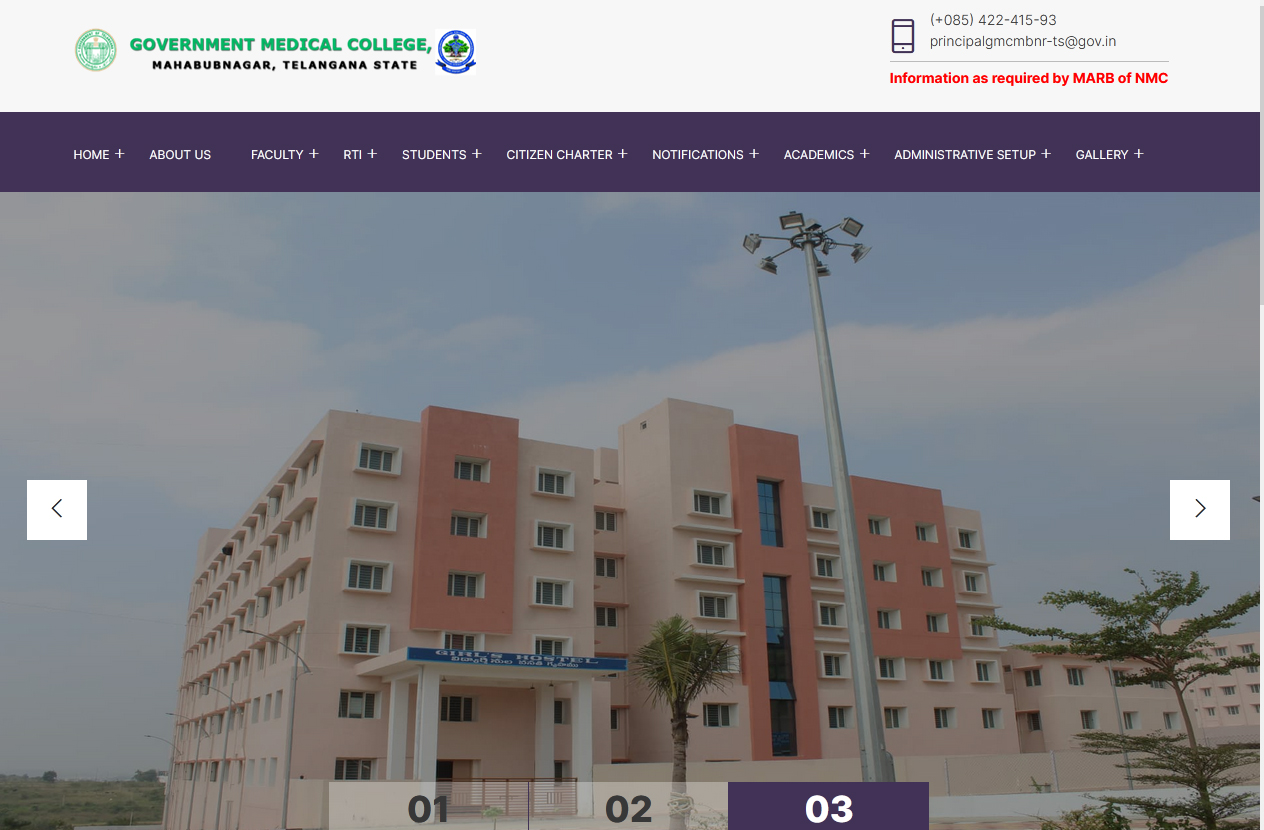
Government Medical College, Mahabubnagar
ABOUT GMC
Government Medical College, Mahabubnagar is a medical school and tertiary Care hospital established at Edira, Mahabubngar district, State of Telangana. The medical college is located on a 50 acre land. The intake of students in this college is 150 per year for MBBS degree course. The college is affiliated to the kaloji Narayana Rao University of health sciences, Warangal, Telangana.
OUR MISSION:
- To enrich the inquisitive minds of its students with up to date and advanced knowledge and information on medical subjects.
- To perform Scientific research and provide quality health services
- To nourish and nurture its students in a way that they always remain benevolent, compassionate and Sympathetic to their patients while performing their professional duties.
OUR VISION
To create a province which provides exemplary exemplary medical education, quality research and health services to the sick and the needy
ABOUT MAHABUBNGAR
Mahabubnagar district is a district in the Indian state of Telangana.
Mahabubnagar was formerly known as Palamoor, meaning "land of milk” due to its milk production.
The name was changed to Mahabubnagar on 4 December 1890, in honour of Mir Mahbub Ali Khan Asaf Jah VI, the Nizam of Hyderabad (1869–1911 AD)
The district shares boundaries with Narayanapet, Vikarabad, Rangareddy, Nagarkurnool, Wanaparthy and Jogulamba Gadwal districts.
History
The area that forms current Mahabubnagar district has held historic significance. It was under Janapada rule by 6th century BCE, and later was Maurya territory.
The region was at the core of the Satavahana dynasty from 221 BCE to 218 CE, and also a large part of the Chalukya dynasty from the 5th to the 11th century CE.
The region was later part of the Kingdom of Golkonda ( 1364 -1512), with its capital city Golkonda located near Hyderabad In 1518 it came under control of the Qutb Shani dynasty, which reigned until 1687.
The region was then a part of l Hyderabad State, ruled by the Asaf Jahi Dynasty, from 1724 to 1948
Administrative divisions
The district has one revenue divisions of Mahabubnagar These are sub-divided into15. Sri S.Venkata Rao is the present collector of the District
Education
Mahabubnagar district falls under the jurisdiction of Osmania University and Palamuru University The district has many government and private medical college, junior,undergraduate and graduate colleges.
Connectivity
The city is located at a distance of 98km from hyderabad of telangana, 130 km from kurnool of AP and 105 km from Raichur of karnataka.
Transport
The city is connected to major cities and towns by means of road and railways. National and state highways that pass through the city are NH 44, State highway 20 and 23.
TSRTC operates buses to various destinations from Mahabubnagar bus station of the city. The city has rail connectivity with the presence of Mahbubnagar Station
M.B.B.S.

Bachelor of Medicine, Bachelor of Surgery (Latin: Medicinae Baccalaureus, Baccalaureus Chirurgiae; abbreviated in many ways, most commonly MBBS, but also MB ChB, BMBS, MB BCh, MB BChir), is the primary medical degree awarded by medical schools in countries that follow the tradition of the United Kingdom. The historical degree nomenclature states that they are two separate undergraduate degrees. In practice, however, they are usually combined as one and conferred together, and may also be awarded at graduate-level medical schools.
Bachelor of Medicine and Bachelor of Surgery (MBBS), is a professional degree in medical science. A person holding the MBBS degree becomes a certified medical practitioner. The duration of MBBS course is five years and six months including one year of rotational internship at hospitals, health centres, and health camps organised by non-profit organisations (NGOs). MBBS course syllabus includes studies on anatomy, pharmacology, pathology as well as community health & medicine, paediatrics, and surgery. The syllabus, prescribed in such a way that MBBS degree holders can choose a specialisation for further majoring and practising medicine. The career specialisations for MBBS students are Nephrology, Cardiology, Gynecology, Anesthesiology, Organ Transplant, Endocrine, and General Surgery, etc.
MD - Bio-Chemistry
MD - Forensic Medicine/Forensic Medicine & Toxicology
MD - Pharmacology
MD - Physiology
MD/MS - Anatomy
- Log in to post comments
- 67 views
